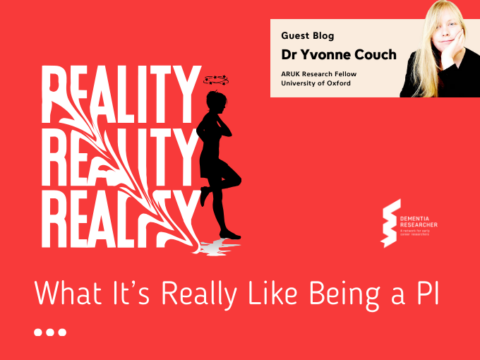 The UK’s National Institute for Health and Care Excellence (NICE) recently produced guidelines around management and support for people living with dementia and their carers (NICE NG97) which included the recommendation that people living with dementia (at all stages of the condition) should be informed about research studies they could participate in. This reflects the growing recognition of the importance of dementia research, and the aim to increase the numbers of people with dementia participating in research as set out in the Dementia 2020 Challenge. However, one of the main characteristics of dementia is the gradual loss of decision-making capacity.
The UK’s National Institute for Health and Care Excellence (NICE) recently produced guidelines around management and support for people living with dementia and their carers (NICE NG97) which included the recommendation that people living with dementia (at all stages of the condition) should be informed about research studies they could participate in. This reflects the growing recognition of the importance of dementia research, and the aim to increase the numbers of people with dementia participating in research as set out in the Dementia 2020 Challenge. However, one of the main characteristics of dementia is the gradual loss of decision-making capacity.
For research, a person living with dementia whose ability to provide consent is affected may require other people to be involved in making decisions about participation. This can raise a number of ethical, legal, and practical challenges which can unfortunately result in people with cognitive impairment being excluded from taking part in research.
Exploring some of these issues as part of my NIHR Doctoral Research Fellowship has helped me to identify some areas which may enable greater inclusion that I would like to share though this blog.
Greater awareness about the legal frameworks for research involving adults lacking capacity
Most research involving adults who lack capacity in England and Wales is governed by the Mental Capacity Act 2005 (MCA) which also applies to other areas of decision-making, however clinical trials of medicines across the UK are governed separately by the Clinical Trials Regulations (CTR). Our research found that the complexity of the different legal frameworks involved means that they are not widely understood by researchers or health and social care practitioners who care for people with conditions such as dementia. Particular areas of misunderstanding are around processes of consultation with a consultee under the MCA, compared with requiring consent from a legal representative under the CTR, and that the basis for the decision is the wishes and preferences of the person living with dementia and not ‘best interests’. Training and education that focusses on these areas would better prepare researchers and practitioners, and we have put together a brief summary including links to more resources.
Moving away from concerns around decision ‘accuracy’
One of the concerns about making a decision about research on behalf of someone else is knowing what their wishes and preferences would be. The ‘accuracy’ with which proxies generally predict preferences has often been questioned. However studies which test accuracy should be viewed with caution on a number of points, including that they are hypothetical scenarios and not real decisions. Alternatively, people report that they are comfortable with granting leeway to the person making the decision, recognising that someone who knows and cares for them may be best placed to make a decision using all relevant factors at the time. Our DECISION Study is now exploring how family members actually make these decisions in real life.
Need for providing information about the role of the decision-maker in addition to information about the study
Researchers generally provide information about the study to the consultee or legal representative through a version of a Participant Information Sheet. However our analysis of information sheets showed that despite undergoing ethical review they rarely included information about the basis for the decision or about the decision-making process, and often contained inaccurate terms and information. Particular discrepancies were found in information provided to those acting as consultees or legal representatives in a professional, as opposed to a personal, capacity. The Health Research Authority (HRA) has guidance and some templates that can be used, and we have put together five top tips to help.
Supporting decision-making by families of people living with dementia
Making decisions about research on behalf of another family member can be difficult, but currently there is no information or support available. Decision-support interventions can help to support the process of decision making, reduce decisional conflict, and lead to choices that are more consistent with the person’s values. In the final stage of this project the findings from the DECISION Study are being used to collaboratively develop a decision-support intervention for families making decisions about research on behalf of someone living with dementia.
And lastly …. thinking about opportunities for advance planning about research participation
The NICE dementia guidelines also recommend offering opportunities for people living with dementia to discuss their preferences and plan ahead, including making advance statements about their wishes and preferences regarding their future care. Advance planning should be also encouraged as a way in which people can also state their views and wishes regarding their participation in research, perhaps through programmes such as Join Dementia Research. Our research suggests that opportunities for these discussions may arise during advance planning about future care and treatment, or when setting up a Lasting Power of Attorney. However, unlike for decisions about health and welfare or finances, there is no formal mechanism in England and Wales for prospectively designating who you want to act as consultee or legal representative, although there have been recommendations to enable this.
We hope that our research findings and recommendations for research practice will support greater inclusion of people living with dementia (at all stages of the condition) in research in the future.
Author
Victoria Shepherd is a Nurse by background and a NIHR Doctoral Research fellow at Cardiff University. Victoria is interested in the legal, ethical and practical issues involved in research with adults who lack capacity to consent, including people living with dementia. Her fellowship focuses on the development of a decision support intervention for family members of people with impaired capacity.
You can follow Victoria on Twitter Follow @VickyLShepherd

 Print This Post
Print This Post




